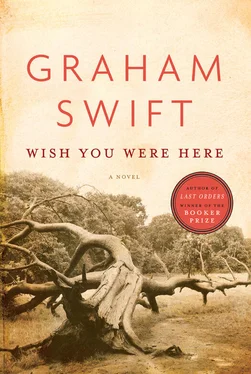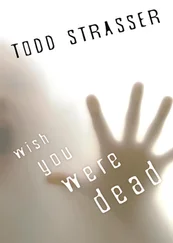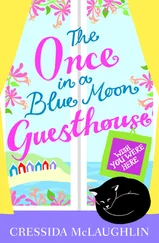She sped back towards Marleston. Could she really do it? She certainly saw herself doing it. She sees herself doing it now, as if there’s still somehow a need. She sees herself stopping by the Jebb gate and opening it. Sees herself driving through and not bothering to do any closing. My God, this is a first. She sees herself roaring into the Jebb yard and lurching to a halt, hand slammed on the horn. No guessing where Jack might be on the farm at this time of day, but in the scene in her head Jack is somewhere conveniently near the yard. And he’s heard this meteor coming down the track.
She sees the family turning out to confront her amazing arrival. Michael. Vera. There’s a difficulty there, she knows it — to tear Jack from his mum. And standing beside Vera is little Tom, aged seven. A difficulty there too — and there always will be. There’s a difficulty now. But it’s only Jack she cares about. My Jack.
And there he is. She looks at him and he looks at her, astonishment denting his not often dentable face. A test for her. A test for him. But she’s already passed hers, by being there — it was always like this, her making the first move — and by sticking her head now out of the window and yelling, ‘Come on, Jacko! Now or never. Quick! Jump in!’
But she doesn’t go through the Jebb gate. She doesn’t even stop by it. And Jack will never know that he was once part of that never-enacted scene. She thinks of her dad who, even now, in his sozzled state, is perhaps unaware of her flight. How can she do it? Ensure that in the course of three days the only two women in his life will have deserted him, and stolen his Land Rover. She thinks of her abandoned dad who, when he hears her driving back down the Westcott track, will surely think, in his half-stupor, that it must be his wife coming home. Coming back! Allie and Ellie and Jimmy, all together at Westcott again.
She drives along the Marleston road. There’s a straight, clear stretch after the Jebb bend, but she’s lost now all the thrill of speed. In any case, she slows for the Westcott gate. She can see the square tower of Marleston church poking up ahead. She gives a strange, pained cry (she gave the same cry again, exactly the same, today) and runs a forearm over her slippery face. She stops, gets out to close the gate dutifully behind her — having left it defiantly open on her way out. She hears its familiar clang.
The twin hedges take her in their grasp, the golden sunshine mocks her. She drives on down, along the dry ruts, to her father who, indeed, since he’s been seeking oblivion anyway, will never know, any more than Jack will, what Ellie has done today. The things we never know. She drives back into Westcott Farm, to her mother’s absence, to her sleeping father (who when she wakes him with a mug of tea, doesn’t want to be woken) and to the mooing, snorting, pissing, shitting fact of cows to be milked.
IT WAS DEEP, steep, difficult but good-looking land, with small patchy fields that funnelled or bulged down to the woods in the valley. They had one field up on the ridge where they grew occasional wheat and autumn feed, otherwise it was down to grass and like almost every farm for miles around: sheep or dairy, and they’d always been dairy — beef calves for sale, and dairy. It was hard work for the softest, mildest thing in the world. It was all about turning the land into good white gallons, as many as possible. And it was all about men being slaves to the female of the species, so Michael Luxton had liked to say, with a sideways crack of his face, when Vera had still been around, especially in her hearing. They were all bloody milksops really.
Each one of those carcasses that were carted off after the cow disease came was a potential hand-out from the Ministry. But that didn’t allow for the slowness or downright shiftiness of the bureaucracy, or for the simple fact that there was nothing much to bridge the gap. Not a single one of their herd had ever been confirmed. The words were ‘suspect’ and ‘contiguous risk’. They just couldn’t be moved, that’s all, though they had to be fed. Nor, at first, could their milk be moved, though they had to be milked. And then they’d nearly all (except for the new calves) been moved anyway — as carcasses. The farm like a ghost farm, the loss of all that penned-up company strangely bereaving. No milk flow, no cash flow, and precious little in the bank. He and Tom got the impression, from their dad’s silences, that the precious little wasn’t even theirs. Meanwhile, when were they supposed to start restocking again and know it wouldn’t be cost and effort for nothing?
Tom hadn’t waited for the final reckoning. Though you couldn’t say it was a sudden move either. He waited till his eighteenth birthday — till he’d be his own man. And you couldn’t say it was a bad move. He’d seen the way the wind was blowing.
And why hadn’t he, Jack, thought of it first? Just to clear off out of it. But it had never occurred to him. And why hadn’t he minded when Tom said that it had been occurring to him all right, for more than a year? ‘This is just for your ears, Jack.’ As if then it became a pact that they’d both entered into, and it was down to Jack, while Tom made the actual move, to cover up for him. And to take it, of course, from Dad afterwards, take all the stick for it, but not say anything for weeks, months, feigning dumb ignorance, buttoning his lip, like some good soldier himself, and only speaking, finally, because he thought his dad must surely have guessed anyway — what else does a boy do? — and because there was no real chance of his father’s getting Tom back.
No, he didn’t know where Tom was. Which was only the truth. Because Tom was in the army and who could say where the army was? Catterick? Salisbury Plain?
Good luck, Tom. As if Tom was doing the escaping for both of them.
Why had he never minded, or even thought about it most of the time? That Tom was better, quicker, smarter at pretty well everything. Including, so it seemed, deciding his own future. Eight years and, for a long time, several inches between them. And no competition. He could knock Tom down any time he liked, but he never had. Had never even wanted to.
Even that gun lying there, Tom was better at that. At twelve or thirteen he could swing it round and make the rabbit hit the shot. Good with a gun — so a soldier’s life for him. But Tom was even better, after Vera died, at taking her place, at being, for them all, a bit of a mum himself. Was that something the army required of a man too?
Jack should have been the one, by rights, to step into her space. Eight years her only boy. And all those mugs of tea. But it was Tom who, at thirteen, was plainly quicker and better in the cooking, washing and looking-after department too. And Jack, at twenty-one, was a big, outdoor man with mud on his boots. If he’d tried to take his mum’s place, Dad would have mocked him. So it was Tom who one day put on Vera’s still flour-dusted, gravy-spotted apron. He and Dad simply watched him do it. It had been hanging on its hook on the corner of the dresser where no one seemed to want to touch it. But it was Tom who took it down and put it on. Like some silent declaration. It was Tom who piled eggs and bacon and triangles of bread into the pan and filled the kitchen with a smell and a sizzle as if someone might be still there who wasn’t.
And not just pile. He could crack those eggs one-handed, just as Mum had. Two neat little half-shells left in his fingers. Jack knew, without trying, he could never have done that. They’d have been eating eggshell for breakfast, spitting out the bits.
Mrs Warburton, Sally Warburton, Mum’s old pal, had come in for a while every day to ‘tide them over’, as she put it, and perhaps to set them all her own example in being a bit of a mum to each other. Maybe Tom got some of it from her. Maybe Tom had puppied up to her while he and Dad did all the heavy work.
Читать дальше








![Питер Джеймс - Wish You Were Dead [story]](/books/430350/piter-dzhejms-wish-you-were-dead-story-thumb.webp)



